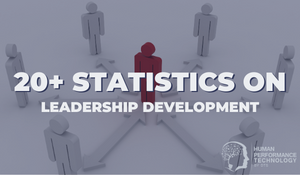30 Interesting Statistics on Emotional Intelligence
We have been conducting a series of internal projects to see what sort of statistics are available on a broad range of workplace topics including leadership, teams, culture, diversity, millennials, engagement, and recruitment. From a larger collection of over 200 statistics relevant to emotional intelligence, here are a few that caught our attention.
- "According to the World Economic Forum’s Future of Jobs Report, emotional intelligence will be one of the top 10 job skills in 2020." Source
- "According to the survey from Levo Institute, 80% of employees consider emotional intelligence crucial for developing their careers." Source
- "According to one study entitled, The Emotional Intelligence of HR, only 30% of companies look for emotional intelligence during the hiring process." Source
- "Approximately 82% of global companies now utilise EQ tests for executive positions; 72% of these companies give the tests to middle management and only 59% of companies give the tests to entry-level positions." Source
- "37% of surveyed organisations use Emotional Intelligence assessments to help inform their leadership development programs." Source
- "59% of employers would not hire someone who has a high IQ but low EI." Source
- "75% of employers said they are more likely to promote a worker with high EI." Source
- "71% of employers say they value emotional intelligence over IQ." Source
- "At a Motorola manufacturing plant, 93% of employees became more productive after the facility adopted stress-reduction and emotional-intelligence programs." Source
- "A Texas-based Fortune 500 Company had utilised personality assessments for candidate selection for years with little results in reducing turnover in their high turnover sales force. After turning to an emotional intelligence-based selection assessment and EQ training and development program, they increased retention by 67 percent in the first year, which they calculated added $32 million to their bottom line in reduced turnover costs and increased sales revenues." Source
- "A large metropolitan hospital reduced their critical care nursing turnover from 65 percent to 15 percent within 18 months of implementing an emotional intelligence screening assessment." Source
- "Sanofi, the French pharmaceutical company, focused on the emotional intelligence skills of its sales force, which boosted annual performance by 12 percent (see the research by S. Jennings and B.R. Palmer in “Sales Performance Through Emotional Intelligence Development,” Organizations and People, 2007)." Source
- "Cherniss and Goleman estimate that EQ based training results in as much as 8x return on investment (ROI) when compared to non-EQ trainings." Source
- "Research conducted with Fortune 500 CEOs by the Stanford Research Institute International and the Carnegie Melon Foundation, found that 75% of long-term job success depends on people skills, while only 25% on technical knowledge." Source
- "TalentSmart tested emotional intelligence alongside 33 other important workplace skills and found that EQ was the strongest predictor of performance, explaining 58% of success in all types of jobs." Source
- "People with high EQ make $29,000 more annually than people with low EQ." Source
- "A single-point increase in your EQ adds $1,300 to your salary." Source
- "In a study of more than 2,000 managers from 12 large organisations, 81% of the competencies that distinguished outstanding managers were related to emotional intelligence. (Boyatzis, 7CM (1982) Hay and McBer)." Source
- "181 different positions from 121 organisations worldwide... 67% of the abilities deemed essential for effective performance were emotional competencies (cf Rosier, 1994) Hay and McBer)." Source
- "The Hay Group states one study of 44 Fortune 500 companies found that salespeople with high EQ produced twice the revenue of those with average or below average scores." Source
- "In UK’s Whitbread group, restaurants with high EQ managers had higher guest satisfaction, lower turnover, and 34% greater profit growth (Bar-On and Orme, 2003)." Source
- "The reason for losing customers and clients are 70% EI-related (e.g., didn’t like that company’s customer service) (Forum Corporation on Manufacturing and Service Companies, 1989 – 1995)." Source
- "Social and emotional abilities were four times more important than IQ in determining professional success and prestige (Feist & Barron, 1996 cited in Cherniss, 2000)." Source
- "75% of careers are derailed for reasons related to emotional competencies, including inability to handle interpersonal problems; unsatisfactory team leadership during times of difficulty or conflict; or inability to adapt to change or elicit trust (The Center for Creative Leadership)." Source
- "Salespeople selected on the basis of emotional competence also had 63% less turnover during the first year (Spencer & Spencer; Spencer, McClelland, & Kelner, cited in competencies earned 139% more than the lower EQ partners (Boyatzis)." Source
- "Organisations that value and widely use Emotional Intelligence are 3.2x more effective at leadership development." Source
- "There is a 31% gap in leadership development effectiveness between organisations where EI is valued, versus those in which it is not." Source
- "A 40-year longitudinal investigation of 450 boys found that IQ had little relation to life success. The most significant predictors were being able to handle frustration, control emotions, get along with other people." Source
- "Another study followed 80 scientists over the course of forty years and found that social and emotional abilities were four times more important than IQ in determining professional success and prestige." Source
- "[Emotional intelligence] accounts for nearly 90 percent of what moves people up the ladder when IQ and technical skills are roughly similar (see "What Makes a Leader" in the Harvard Business Review, January 2004)." Source
Topics:
Emotional Intelligence
Theo Winter
Client Services Manager, Writer & Researcher. Theo is one of the youngest professionals in the world to earn an accreditation in TTI Success Insight's suite of psychometric assessments. For more than a decade, he worked with hundreds of HR, L&D and OD professionals and consultants to improve engagement, performance and emotional intelligence of leaders and their teams. He authored the book "40 Must-Know Business Models for People Leaders."

/30%20Statistics%20On%20Recruitment%20%26%20Retention.png?width=374&name=30%20Statistics%20On%20Recruitment%20%26%20Retention.png)

We Would Like to Hear From You (1 Comment)